Sources
- ↑ "Don't Ever Change". The Beatles Bible. 2010-12-22. Retrieved 2011-08-20.
| Studio albums | |
|---|---|
| Compilation albums | |
| Singles |
|
| Crickets solo records |
|
| Related | |
Live at BBC notes
| "Don't Ever Change" | |
|---|---|
| Song by The Beatles | |
| from the album Live at the BBC | |
| Released | 30 November 1994 (UK) 5 December 1994 (US) |
| Recorded | 1 August 1963 |
| Studio | Playhouse Theatre, Manchester |
| Genre | Pop |
| Length | 2:03 |
| Label | Apple |
| Songwriter(s) | Goffin-King |
| Producer(s) | Terry Henebery |
"Don't Ever Change" is a 1961 popular song written by Gerry Goffin and Carole King. Intended for The Everly Brothers but rejected by their management, it is one of the Goffin-King team's lesser-known songs, although a version by The Crickets reached the top 5 in the United Kingdom (Jerry Naylor lead vocal). The Beatles performed the song on their BBC radio show Pop Go the Beatles, which was later released on their 1994 compilation Live at the BBC . It was taped on 1 August 1963, had its first broadcast on 27 August 1963, was produced by Terry Henebery and was a rare harmony duet between Paul McCartney and George Harrison. [1] The song was also covered by Brinsley Schwarz on their Please Don't Ever Change album in 1973, by Bryan Ferry on his 1973 album These Foolish Things , and by Mud on their 1982 album Mud featuring Les Gray.
Personnel per The Beatles Bible.
Live at BBC notes
"Honey Pie" is a song by the English rock band the Beatles, from their 1968 eponymous double album The Beatles. The song was written entirely by Paul McCartney and credited to the Lennon–McCartney partnership.
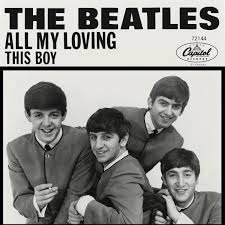
"This Boy" is a song by the English rock band the Beatles, written by John Lennon (credited to Lennon–McCartney). It was released in November 1963 as the B-side of the band's Parlophone single "I Want to Hold Your Hand". In the United States, it was issued in January 1964 on Meet the Beatles! which was Capitol Records' reconfigured version of the With the Beatles album. The Beatles performed the song live on 16 February 1964 for their second appearance on The Ed Sullivan Show. An instrumental easy listening arrangement by George Martin, re-titled "Ringo's Theme (This Boy)", was featured in the film A Hard Day's Night and the United Artists soundtrack album. This version was also issued as a single, reaching number 53 in the US and number one in Canada.
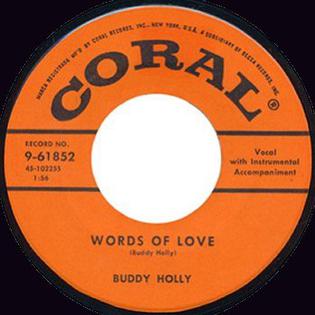
"Words of Love" is a song written by Buddy Holly and released as a single in 1957.
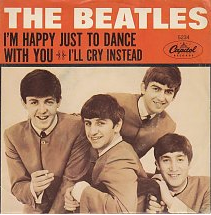
"I'm Happy Just to Dance with You" is a song written by John Lennon and Paul McCartney and recorded in 1964 by the English rock band the Beatles for the film soundtrack to A Hard Day's Night. Lead vocals are by George Harrison, whose performance in the film marked the first mass media depiction of Harrison singing lead.
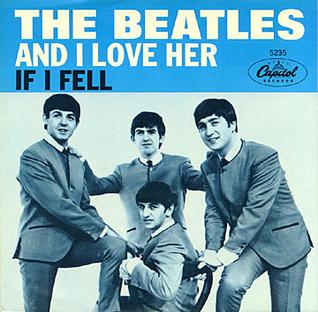
"And I Love Her" is a song recorded by English rock band the Beatles, written primarily by Paul McCartney and credited to the Lennon–McCartney partnership. It is the fifth track of their third UK album A Hard Day's Night and was released 20 July 1964, along with "If I Fell", as a single release by Capitol Records in the United States, reaching No. 12 on the Billboard Hot 100.

"Misery" is a song by the English rock band the Beatles from their 1963 debut album Please Please Me. It was co-written by John Lennon and Paul McCartney. According to Lennon, "It was kind of a John song more than a Paul song, but it was written together." McCartney was to say: "I don't think either one of us dominated on that one, it was just a hacking job."
"Chains" is a rhythm and blues song written by husband-and-wife songwriting team Gerry Goffin and Carole King. It was a hit for the American girl group the Cookies in 1962 and for the English rock band the Beatles, who recorded the song for their debut album in 1963. King recorded a solo version of "Chains" for her 1980 album Pearls: Songs of Goffin and King.

"Ask Me Why" is a song by the English rock band the Beatles originally released in the United Kingdom as the B-side of their single "Please Please Me". It was also included on their 1963 debut album Please Please Me. It was written primarily by John Lennon and credited to the Lennon–McCartney partnership.
"Do You Want to Know a Secret" is a song by English rock band the Beatles from their 1963 album Please Please Me, sung by George Harrison. In the United States, it was the first top ten song to feature Harrison as a lead singer, reaching No. 2 on the Billboard chart in 1964 as a single released by Vee-Jay, VJ 587. In the UK, Billy J. Kramer released a cover of the song as his debut single, reaching No. 1 on the NME singles chart and No. 2 on the Record Retailer chart.
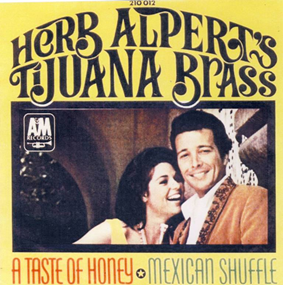
"A Taste of Honey" is a pop standard written by Bobby Scott and Ric Marlow. It was originally an instrumental track written for the 1960 Broadway version of the 1958 British play A Taste of Honey. Both the original and a later recording by Herb Alpert in 1965 earned the song four Grammy Awards.

"I'll Get You" is a song by the English rock band the Beatles, written by John Lennon and Paul McCartney, and released by the Beatles as the B-side of their 1963 single "She Loves You". The song was initially titled "Get You in the End".

"Dig It" is a song by the English rock band the Beatles from their 1970 album Let It Be. The song is credited to Lennon/McCartney/Harrison/Starkey, and is one of the few songs to be credited to all of the Beatles. This song and the 39-second "Maggie Mae" appear on the Let It Be album, but are excluded from the Let It Be... Naked album, instead being replaced with "Don't Let Me Down". Glyn Johns' May 1969 version of the album, then titled Get Back, had a four-minute excerpt of "Dig It", which was later reduced to the much shorter version in the final album.

"Don't Let Me Down" is a song by the English rock band the Beatles, recorded in 1969 during the Let It Be sessions. It was written by John Lennon and credited to the Lennon–McCartney songwriting partnership. The band recorded the song with keyboardist Billy Preston; the single release with "Get Back" was credited to "the Beatles with Billy Preston". Originally released as a B-side, producer Phil Spector excluded the song from Let It Be. However, it was eventually included on an alternative mix of the album, Let It Be... Naked.
"Young Blood" is a song written by Doc Pomus along with the songwriting team Jerry Leiber and Mike Stoller that first became a hit by The Coasters in 1957.
"I'll Be on My Way" is a song written by Paul McCartney, credited to Lennon–McCartney, first released on 26 April 1963 by Billy J. Kramer with the Dakotas as the B-side of their hit debut single "Do You Want to Know a Secret", a song also written by Lennon–McCartney. The single reached number two in the UK charts while "From Me to You" by the Beatles occupied the number 1 position. The Beatles recorded a version of the song on 4 April 1963 for BBC radio, first released on the 1994 compilation album Live at the BBC.

"Let Me Roll It" is a song by the British–American rock band Paul McCartney and Wings, released on their 1973 album Band on the Run. The song was also released as the B-side to "Jet" in early 1974, and has remained a staple of McCartney's live concerts since it was first released.

"Glad All Over" is a 1957 song recorded by rock and roll and rockabilly artist Carl Perkins, "The Rockin' Guitar Man", at Sun Records in 1957. It was released as a 45 and 78 single, Sun 287, on January 6, 1958. It was written by Aaron Schroeder, Sid Tepper, and Roy Bennett. It is not the same song as the single "Glad All Over" released in 1963 by The Dave Clark Five.
"I'm Gonna Sit Right Down and Cry (Over You)" is a popular song written in 1953 by Joe Thomas and Howard Biggs and originally recorded by Roy Hamilton in 1954. Since then, it became something of a minor pop standard, largely due to several well-received versions of the song. It is best known for appearing on Elvis Presley's first album, and for a performance of the song by The Beatles (which appears on their Live at the BBC album). The Beatles also performed the song at the Star-Club in Hamburg on New Year's Eve, 31 December 1962, during their fifth and final Hamburg residency. This version appears on their album, Live! at the Star-Club in Hamburg, Germany; 1962.
"I Just Don't Understand" is a song written by Marijohn Wilkin and Kent Westberry, released by Swedish-born singer and American citizen Ann-Margret. It charted at No. 17 on the US Billboard Hot 100 chart in 1961. It was one of the first records to feature a fuzz-tone guitar. It was later recorded by the Beatles on 16 July 1963 at the BBC Paris Studio, London for the Pop Go The Beatles radio show and appeared on their 1994 compilation album Live at the BBC, with lead vocals by John Lennon.
"Ooh! My Soul", sometimes spelled "Oh My Soul", is a 1958 song by Little Richard. It first appeared on a May 1958 single, then on his eponymous second album. It was subsequently recorded by the Beatles in 1963 for the BBC, and by Big Brother and the Holding Company in 1966.